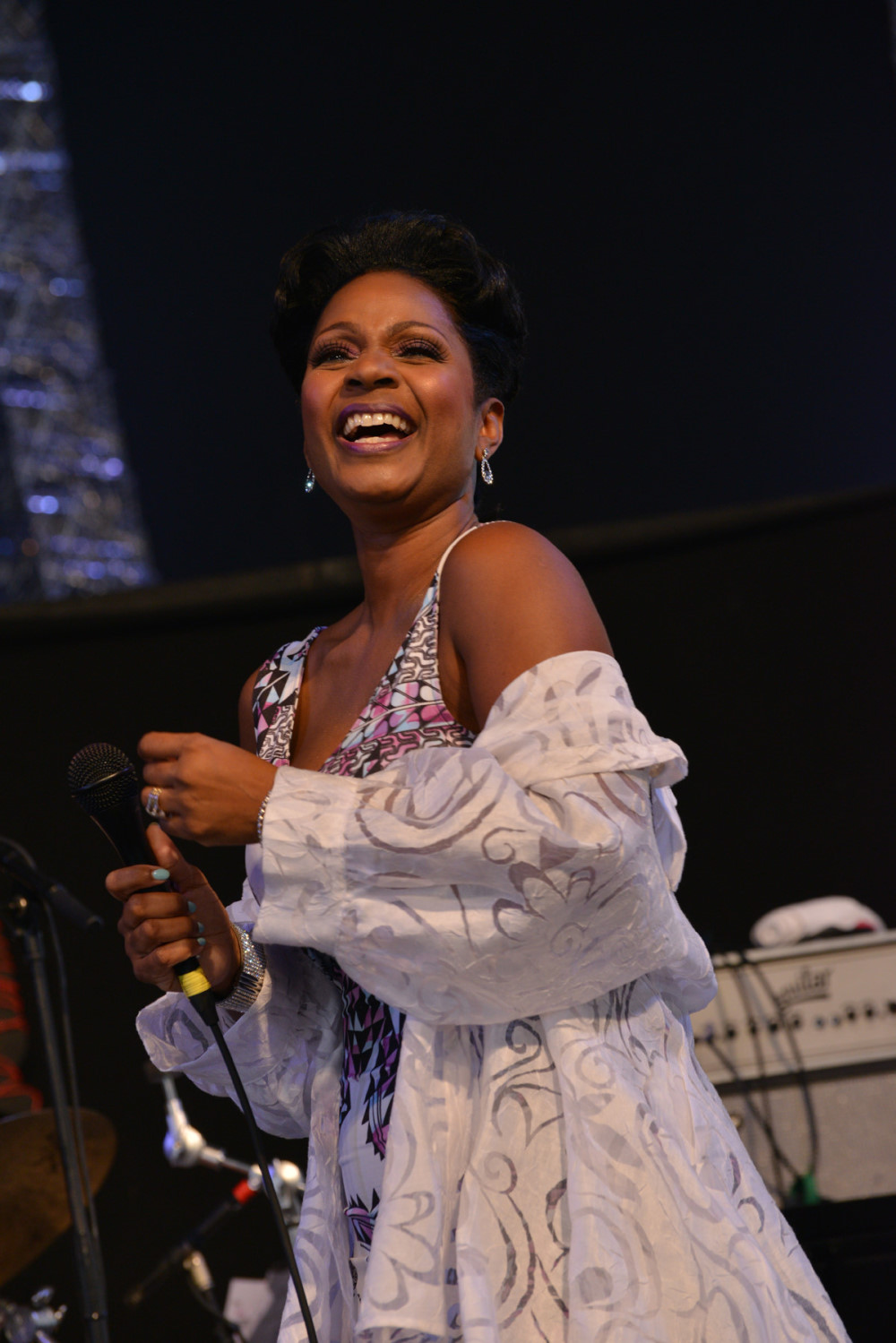Stephanie Jordan is a powerhouse of dynamic musicality, a modern and unique voice shining through the long, storied history of jazz music. In performance as well as one-on-one she is humble but strong, gentle but full of power-a dichotomy that makes its way into her own performance, carefully crafted over many years of many audiences.
Stephanie grew up in the rich musical environment of New Orleans, in a family who played a variety of instruments-yet she describes herself as an “accidental singer,” someone who wanted to sing, but didn’t think she could. That changed one night on her birthday, at a club where her brother was playing. He asked her to sing a song with him, and her career was born.
Her philosophy on singing comes from many hours of listening to the radio, when radio was great-singers like Chaka Kahn, Gladys Knight, Aretha Franklin, Diana Ross, and many R&B groups in the 70s. “When I would listen to the radio,” she says, “you had to really sing to be played. Nowadays, you can go record an album and they can doctor your voice up in the studio. Back in the day, that didn’t happen-people had to sing.” Though she loved R&B, she was surrounded by New Orleans jazz, and jazz is what got into her blood
She is said to be true to the jazz tradition, but she is also willing to take chances. “It doesn’t have to be a ‘jazz song’ for me to sing it. If I can hear jazz in a song-if it’s a good song, and if I can feel it in my heart-I just want to sing it.”
Stephanie has forged her path steadily, with a career spanning nearly 25 years. “When you’re a jazz singer, it doesn’t happen overnight. I’ve been a lot of places, I’ve done a lot of singing, but I had to grow up in the music.” Her configuration has evolved along with her show, starting as a duo, then a trio, then with quartets and quintets behind her. Now she has an entire ensemble-a five-piece horn section, and a quartet of piano, bass, drums, and guitar.
Now, a few years after her latest release, Yesterday When I Was Young: A Tribute To Lena Horne, she’s ready to head back to the studio again, this time with original music as well as interpreting other women composers such as Joni Mitchell, Abby Lincoln, Erykah Badu, Nina Simone. “I’m examining compositions by women because I think it’s important that women’s voices are heard and that we tell our own story. A lot of jazz songs, which are great songs, are really written by men. And women singers have made a lot of those songs really famous-like Ella Fitzgerald and Sarah Vaughan, some of the greatest composers of jazz, their music would have been an obscurity because the songs really aren’t that hip without the interpretation of those women. But I think right now, jazz today has to be about women writing their own songs.”
She speaks of unique challenges in the world of jazz music that women face today. “Jazz is a very male-dominated industry…. But women have to understand that when you’re a singer, you have to get out there and just create your own way.”
A way that she chooses to keep fresh and relevant, finding the balance between pleasing a jazz audience with “jazz standards,” but also reaching out and cultivating a new
audience, drawing younger people into the music. “That’s how the music is going to stay alive. You can’t just keep doing the same old stuff in the same old way and expect your audience to grow.”
Stephanie has been using the Audix OM6 for her vocals since she first was introduced to the mic at the Jazz Fest in New Orleans several years ago. “The first time I used an Audix mic, I immediately noticed-‘Wow, something’s different. What is this microphone?!'” After talking to her sound technician, she knew she had found the mic she had been waiting for. The issues she had run into before-feedback, lack of clarity-were not a problem with the OM6. “When I have my Audix mic, the show is just effortless. It picks up everything…I don’t have to push. I even love what I hear in the monitor, and that makes a big difference in how you perform. Some microphones just have to do too much to get what you want…when I’m using my Audix, I get the sound I want.”
In her performances, she ranges from very controlled, quiet notes, but her voice also grows to a powerful intensity. The OM6 can handle all of it. “I like a microphone that can really switch up and do that for me, and allow me to go from zero to 100 at any moment if I want to. I love the flexibility of this mic.”
“As a singer, and as a human being, I just have a whole lot to do! It keeps you moving, always a new project. You gotta keep moving


